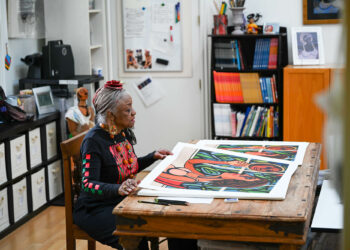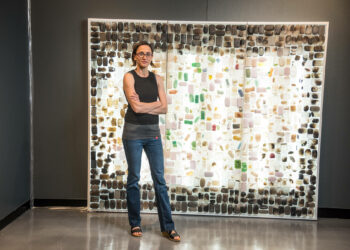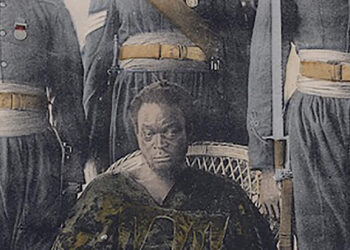People relate more through social media platforms in our progressively technological society. We at ART AFRICA are extending an invitation to artists from the African diaspora to use our Instagram account as a platform to give us their viewpoint as an artist, showcase their work, art-making process, studios and current exhibitions.
Yesmine Ben Kehlil is a Tunisian born artist who focuses primarily in drawing. She graced our account with her presence by giving us a sneak peak of a series she was currently working. We got in touch with her again to hear how Tunisia has influenced her work, how Videodrome (1983) inspired her series New Flesh and how social media has broadened the playing field for young emerging artists.
https://www.instagram.com/p/BWsUKdCH-vT/?taken-by=artafrica_mag
ART AFRICA: Growing up in Tunisia, how has your country and more immediate location, moulded your artwork towards what it is today?
Yesmine Ben Khelil: Growing up in Tunisia – under a dictatorship – definitely had an impact on my work. I was pushed to express myself in ‘round-a-bout’ ways, causing my work to have a political dimension.
My artistic approach has also evolved according to the events that have happened in Tunisia, where the news, images and the Internet play a central role in my practice.
Living in Tunisia has taught me about the difficulties of the world, and especially the difficulties in representing these difficulties. I try to highlight and question these issues, this certain ‘void’, in my work.
With your ART AFRICA Takeover you posted work from the series you were currently working on, New Flesh. Do you mind elaborating on your inspiration for this series.
There are two main sources of inspiration for this series – the anthropological images created in Northern Africa during the colonial era, and Videodrome – a 1983 horror film where the protagonist undergoes a series of bizarre and violent hallucinations, ultimately losing touch with reality. I hoped to connect these heteroclite inspirations, retracing the evolution of a culture perpetually in metamophosis.
The anthropological images and surveys aimed to prove the ‘real’ identity of the North African people by studying the dimensions of their skulls; Videodrome tells the story of a television show which causes a brain tumour, altering reality, and transforming the human species.
I hoped to create a link between the anthropological investigation and the film – expanding on this idea of an abstract thing generating a physical mutation. In this body of work, I investigate the path of an identity metamorphosis that transforms us physically.
https://www.instagram.com/p/BWpr9TNnIi2/?taken-by=artafrica_mag
You seem to use traditional modes of art-making – collage and drawing for example. How do you feel about new media and the way in which artist are starting to move towards technology or incorporating the use of technology in their art?
I use technology mostly in my creative process, but I do think that it will become more and more important in my overall practice. I like the idea of confronting the virtuality of new media, especially to combine it with the materiality of more traditional mediums of art-making.
However, I am most interested in the daily use of technology, and the lo-fi aesthetics that it generates – people are able to tinker with images using just a phone and editing software. It’s incredible.
Personally, I’ve only made ‘found footage’ videos as the logical continuation of my collages, but I would like to create my own videos in the near future.
You are exhibiting at 1:54 London this year with the Primo Marella Gallery – are you excited for this art fair, and are there any other art events that you would like to be showcased at someday, possibly future goals?
Yes I do! It’s important to be present at these kind of events – but I actually don’t have any specific goals (or rather I’m too superstitious to talk about it!). Otherwise, a biennial like EVA International in Ireland seems really interesting. In general, all artistic events that offer a unique view of contemporary art, or question the decentralisation of the art world interest me.
https://www.instagram.com/p/BW4q_PYHmxu/?taken-by=artafrica_mag
Do you feel as a relatively young artist, that social media and the side of digital coverage is fundamental in helping new-blood artists get into the international art world?
I’m not sure that age is important in this regard. Social network fields are useful, but it all depends on how you use it. For example, the Instagram accounts of some artists are almost all photographs of their artworks, and it becomes interesting because they integrate it into their practise – becoming more than just self-promotion.
You can view the ART AFRICA Takeover here and support the artists Instagram here.



